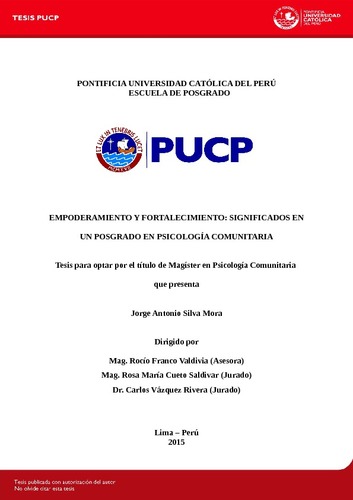| dc.contributor.advisor | Franco Valdivia, Rocío | |
| dc.contributor.author | Silva Mora, Jorge Antonio | es_ES |
| dc.date.accessioned | 2016-04-14T17:33:12Z | es_ES |
| dc.date.available | 2016-04-14T17:33:12Z | es_ES |
| dc.date.created | 2015 | es_ES |
| dc.date.issued | 2016-04-14 | es_ES |
| dc.identifier.uri | http://hdl.handle.net/20.500.12404/6716 | |
| dc.description.abstract | El empoderamiento es un concepto que ha producido un intenso debate académico al interior de la
Psicología Comunitaria Latinoamericana. Derivado del concepto empowerment, venido de la
Psicología Comunitaria Norteamericana, ha evolucionado ramificándose hacia algunos usos
contradictorios a la disciplina en Latinoamérica. Esto ha dado lugar al surgimiento de términos
alternativos como el fortalecimiento. Las preguntas que surgen son si estos dos términos evocan
conceptos similares al interior de la Psicología Latinoamericana y si son pertinentes para su contexto.
Para nuestra exploración empleamos la técnica de las redes semánticas naturales. La aplicación se
hizo a 16 participantes: 10 estudiantes y 6 docentes de un posgrado de maestría en Psicología
Comunitaria en una universidad de Lima. Los resultados mostraron que la palabra poder es la matriz
de la definición del término empoderamiento y comanda el conjunto de palabras nucleares
definidoras. Sin embargo, estas tienden a la fragmentación por lo que no queda definido claramente el
concepto prestándose a diferentes interpretaciones y usos. Contrariamente en la definición del término
fortalecimiento el conjunto de definidoras tienden a la integración, surgiendo una noción del poder
adquirido a partir del crecimiento endógeno como premisa básica. Se discute si estos resultados tienen
que ver con el desarrollo del concepto empoderamiento, de un comienzo políticamente transformador
y emancipador hacía un uso actual tendiente a la adaptación y a la regulación bajo las leyes del
mercado capitalista. Se discute también la posible vigencia de esta contradicción y tensión dentro de
las subjetividades de los participantes. Se concluye que el mayor reto sigue siendo la necesaria
transformación e integración de opresores y oprimidos para el desarrollo de una sociedad más justa,
valor fundamental de la Psicología Comunitaria Latinoamericana. | es_ES |
| dc.description.abstract | Empoderamiento is a concept that has caused an intense academic debate within Latin American
Community Phycology. The concept is adapted from the North American Community Psychology
term ‘empowerment’ and has evolved towards some contradictory applications in the discipline in
Latin America. Such contradictions have resulted in the emergence of alternative terms like
Fortalecimiento. With the creation of these new terms the questions that remain are weather or not
they are being used within the Latin American Community Psychology to refer to the same concept
and if they are relevant for the context. The technique used for this study is Natural Semantic
Networks. The research was performed with 16 participants: 10 students and 6 teachers of a
postgraduate master's degree in community psychology at a university in Lima. On the one hand, the
results show that the word power is the matrix of the definition of Empoderamiento and it leads the
group of defining nuclear words. However, the rest of its defining nuclear words of Empoderamiento
tend to be fragmented. Consequently, the concept they are referring to is not clearly outlined and it
serves different interpretations and usages. On the other hand, for the matrix of definition of the term
Fortalecimiento, the group of defining nuclear words had a tendency towards integration. The notion
of acquired power emerges with endogenous growth as a basic premise. The study discusses what
these results have to do with the development of the concept of empowerment from a starting point of
political transformation and emancipation to the current tendency of adaptation and regulation under
the rules of the capitalist market. It also discusses if this contradiction is still present and the tension
whiting the subjectivities of the participants. Finally, the study concludes that this research show the
main challenge continues to be the necessary transformation and integration of oppressors and
oppressed for the development of a fairer society which is a fundamental value of Latin American
Community Phycology. | es_ES |
| dc.description.uri | Tesis | es_ES |
| dc.language.iso | spa | es_ES |
| dc.publisher | Pontificia Universidad Católica del Perú | es_ES |
| dc.rights | info:eu-repo/semantics/openAccess | es_ES |
| dc.rights.uri | http://creativecommons.org/licenses/by-nc-sa/2.5/pe/ | * |
| dc.subject | Poder (Ciencias sociales) | es_ES |
| dc.subject | Psicología comunitaria | es_ES |
| dc.subject | Empoderamiento. | es_ES |
| dc.subject | Desarrollo de la comunidad | es_ES |
| dc.title | Empoderamiento y fortalecimiento : significados en un posgrado en psicología comunitaria | es_ES |
| dc.type | info:eu-repo/semantics/masterThesis | es_ES |
| thesis.degree.name | Magíster en Psicología Comunitaria | es_ES |
| thesis.degree.level | Maestría | es_ES |
| thesis.degree.grantor | Pontificia Universidad Católica del Perú. Escuela de Posgrado | es_ES |
| thesis.degree.discipline | Psicología Comunitaria | es_ES |
| renati.discipline | 313287 | es_ES |
| renati.level | https://purl.org/pe-repo/renati/level#maestro | es_ES |
| renati.type | http://purl.org/pe-repo/renati/type#tesis | es_ES |
| dc.publisher.country | PE | es_ES |
| dc.subject.ocde | https://purl.org/pe-repo/ocde/ford#5.01.00 | es_ES |






